Supreme Court delivers win for Native American tribes in adoption case
WASHINGTON — The Supreme Court on Thursday handed a major win to Native Americans by rejecting a challenge to a federal law aimed at protecting children and buttressing tribal identity.
In a 7-2 vote, the court turned away a series of claims seeking to invalidate parts of the Indian Child Welfare Act enacted in 1978 to keep Native American children within tribes. Among the provisions challenged was one that gives preference to Native Americans seeking to foster or adopt Native American children.
President Joe Biden said in a statement that the decision "keeps in place a vital protection for tribal sovereignty and Native children."
The court, in a ruling authored by Justice Amy Coney Barrett, said the challengers did not have legal standing to contest whether the preference provisions violated the equal protection clause of the 14th Amendment by discriminating on the basis of race.

Barrett wrote that the challengers had sued the federal government, but noted that it is state courts that enforce the preference provisions and that state agencies place the children. Therefore their claims could not be redressed by the federal government and must be dismissed, she said.
Emphasizing that the race discrimination issue is still undecided, conservative Justice Brett Kavanaugh wrote in a concurring opinion that it is a "serious" question that the court should decide in a subsequent case.
The majority did, however, conclude that Congress has the authority to legislate on the issue of Native American family law and rejected challenges on those grounds.
Barrett wrote that the challengers were seeking a "constitutional carveout" saying Congress cannot legislate on family law, but that since the founding of the United States, it has been clear that Congress has broad authority to pass laws on a wide range of issues.
"Family law is no exception," she said.
The ruling came as a major relief to tribes, who were concerned that the court would weaken or entirely strike down a law that plays an important role in maintaining tribal identity.
"It was a big sigh of relief, just that 7-to-2 vote," said Buu Nygren, president of Navajo Nation. "I think that really showcases what the Supreme Court justices think about Indian Country."
Chuck Hoskin, principal chief of Cherokee Nation, said that although there will be future challenges to the law, "I think for now, we're very satisfied that this was a really solid win for an important law."
Cherokee Nation and Navajo Nation both defended the law at the Supreme Court, as did the Morongo Band of Mission Indians, Oneida Nation, and Quinault Indian Nation.
The ruling also marks the second time this month that the court has rejected conservative efforts to rein in laws aimed at protecting minority groups, following the ruling last week to reaffirm a key part of the Voting Rights Act. The court has yet to rule on another big race-related case in which it could end the consideration of race in college admissions.
Two of the court’s six conservative justices, Clarence Thomas and Samuel Alito, dissented.
Alito wrote that although Barrett said the law concerned vulnerable children, the ruling "disserves the rights and interests of these children and their parents, as well as our Constitution's division of federal and state authority."
The law was enacted in response to a long history of Native American children being disproportionately removed from their families by both states and the federal government in an effort to assimilate them into English-speaking Anglo-centric society and loosen tribal ties.
The challengers are led by Chad and Jennifer Brackeen — a white evangelical Christian couple who sought to adopt a Native American boy — as well as the states of Texas, Indiana and Louisiana. The couple adopted the child after a potential placement with a Navajo family fell through. They are also seeking to adopt the child’s half-sister, known in court papers as Y.R.J., who lives with them.
Matthew McGill, a lawyer representing the Brackeens, said he will pursue the race discrimination claim in the adoption proceedings in state court.
"Our main concern is what today's decision means for the little girl, Y.R.J. — now five years old — who has been part of the Brackeen family for nearly her whole life," he added.
The law was defended by the Biden administration and the five tribes. The tribes warned that striking down provisions of the law on racial discrimination grounds would threaten centuries of law that treat Native American tribes as distinct entities.
Both sides appealed to the Supreme Court after the New Orleans-based 5th U.S. Circuit Court of Appeals in 2021 issued a splintered decision in which judges were divided over the key issues. A district judge had previously held that the law was unconstitutional.
The Supreme Court has been closely divided in two major recent cases on Native American issues. In 2020, the court expanded tribal authority in Oklahoma in a 5-4 ruling authored by Justice Neil Gorsuch. But in a follow-up case last year seeking to limit the impact of the earlier ruling, the court reversed course, ruling 5-4 to widen state power over tribes in certain instances.
Between the two rulings, liberal Justice Ruth Bader Ginsburg, who had sided with the tribes in the 2020 case, died and was replaced by Barrett, creating the court’s current 6-3 conservative majority. Barrett cast the deciding vote against the tribes in the second case, while Gorsuch joined the three liberal justices in dissent.
Gorsuch, who has proved a champion of Native American rights in a number of cases, mentioned in a concurring opinion how the court in the past has often failed to deliver justice to tribes.
"Often, Native American tribes have come to this court seeking justice only to leave with bowed heads and empty hands," he wrote. "But that is not because this court has no justice to offer them."
